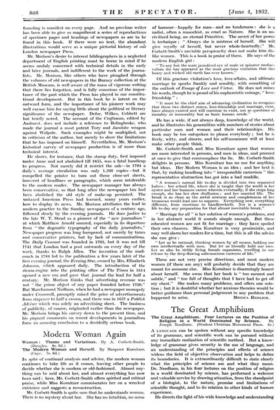Modern Woman Again
Woman : Theme and Variations. By A. Corbett-Smith. (Douglas. 8s. Bd.) The Modern Woman and Herself. By Margaret Kornitzer. (Cape. 7s. ad.) lie spite of continual analysis and advice, the modern woman continues to take life as it comes, leaving other people to decide whether she is modern or old-fashioned. Almost any- thing can be said about her, and almost everything has now been said ; here, Mr. Corbett-Smith offers spirited and critical praise, while Miss Kornitzer commiserates her on a wrecked existence and suggests a reconstruction.
Mr. Corbett-Smith is quite sure that he understands woman. There is no mystery about her. She has no intuition, no sense
of humour—happily for man—and no tenderness : she is a sadist, often a masochist, as cruel as Nature. She is an un- civilized being, an eternal Primitive. The secret of her power is technique ; " Always she is mistress of herself. She will give royally of herself, but never whole-heartedly." Mr. Corbett-Smith's enviable perspicacity does not make him dis- like women. This is a book in praise of them. He says of the modern English girl :
" To any but the most jaundiced eye of male or spinster mediae- valism she has appeared as the most gracious visitation that this hoary and wicked old earth has ever known."
Of this gracious visitation's love, love-affairs, and ultimate marriage he speaks frankly and sensibly, with something of the outlook of Essays of Love and Virtue. He does not mince his words, though he is proud of his euphemistic coinage, " love- friendship " : It must be the chief also of advancing civilization to recognize that these two distinct states, love-friendship and marriage, exist, have always existed and will continue to exist, not as questions of morality or immorality but as basic human needs."
He has a wide, if not always deep, knowledge of the world, and he illustrates his generalities with numbers of stories about particular men and women and their relationships. His book may be too outspoken to please everybody ; but he is lively, witty, and sincere, and his self-assurance will at least make other people think.
Mr. Corbett-Smith and Miss Kornitzer agree that women are more interested in persons, and men in ideas, and proceed at once to give that commonplace the lie. Mr. Corbett-Smith delights in persons. Miss Kornitzer has no use for anything but ideas. Her Modern Woman is an idea ; and her text is that, by rushing headlong into " irresponsible careerism " this representative abstraction has got into a bad muddle.
" A woman's normal life to-day is divided into two separated halves her school life, where she is taught that the world is her oyster and her business career wherein eventually, if she stops long enough, she has her slow disillusion ; and her married life. Tho break is as clean as the awful newness and completeness of her trousseau would lead one to suppose. Everything new, everything different, from emotions to handkerchiefs. Nor is a woman's life to-day any preparation for that almost inevitable break."
" Marriage for all " is her solution of women's problems, and in her abstract world it sounds simple enough. But these educated women are not fit for marriage : they have spoiled their own chances. Miss Kornitzer is very pessimistic, and may well alarm her readers for a time, but this is all the advice she can give : " Let us be rational, thinking women by all means, holding our own intellectually with men. But let us literally hold our own. Let us also be. richly living female organisms, ravelling in our release to the deep-flowing subconscious currents of life."
These are not very precise directions, and most modern women (if there are any) will probably decide that they arc meant for someone else. Miss Kornitzer is disarmingly honest about herself. She owns that her book is " too earnest and subtle," and " too full of thoughts that I have had to get off my chest." She makes many problems, and offers one solu- tion ; but it is doubtful whether her anxious theories would be better guidance than personal judgement in any problem that




































 Previous page
Previous page